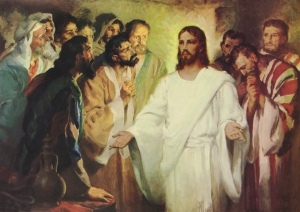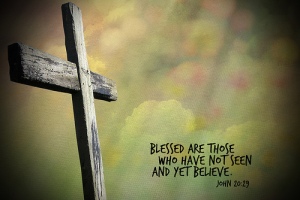“Doubting ______________________________”
[Insert Your Name Here]
New Testament Lesson: John 20:19-31
April 27, 2014, First Presbyterian Church of Jesup
Biblical Storyteller, Casey FitzGerald presents John 20:19-31:
 Come one come all: the amazing Jesus who walks through doors, lives again (without being a zombie), and walks on water!
Come one come all: the amazing Jesus who walks through doors, lives again (without being a zombie), and walks on water!
 How do we wrap our minds around all the things that we’re told Jesus is capable of? How do we believe in all that Jesus was and continues to be without piecemeal-ing out what is easy to accept from what seems impossible?
How do we wrap our minds around all the things that we’re told Jesus is capable of? How do we believe in all that Jesus was and continues to be without piecemeal-ing out what is easy to accept from what seems impossible?
 In our scripture today we’re told that the disciples hid behind locked doors and Jesus showed up, unbound by strict physics or locked doors. Scripture tells us that the disciples were hiding in fear of the Jews, a strange thought because they themselves were Jewish, as was their Lord, Jesus. Some have even suggested that they were hiding behind that door out of fear of Jesus himself. That they were afraid of how Jesus would confront them after their Maundy Thursday and Good Friday desertions.
In our scripture today we’re told that the disciples hid behind locked doors and Jesus showed up, unbound by strict physics or locked doors. Scripture tells us that the disciples were hiding in fear of the Jews, a strange thought because they themselves were Jewish, as was their Lord, Jesus. Some have even suggested that they were hiding behind that door out of fear of Jesus himself. That they were afraid of how Jesus would confront them after their Maundy Thursday and Good Friday desertions.
 Jesus comes into their fear, into their mourning, and says “peace be with you.” As became a pattern throughout his ministry, Jesus was acting in an entirely unexpected way. They were anticipating confrontation, vengeance, at the very least deep sadness. But instead Jesus comes in peace. Peace is an interesting way to respond to people whose inaction caused violence against you. The disciples we certainly shocked by Jesus’ presence and perhaps even more so by his attitude. They were overcome with joy at having him among them again and spread this news to those who did not experience Jesus face to face.
Jesus comes into their fear, into their mourning, and says “peace be with you.” As became a pattern throughout his ministry, Jesus was acting in an entirely unexpected way. They were anticipating confrontation, vengeance, at the very least deep sadness. But instead Jesus comes in peace. Peace is an interesting way to respond to people whose inaction caused violence against you. The disciples we certainly shocked by Jesus’ presence and perhaps even more so by his attitude. They were overcome with joy at having him among them again and spread this news to those who did not experience Jesus face to face.
 Thomas was not with them. Doubting Thomas, as he’s posthumously nicknamed, heard about Jesus’ post resurrection second hand, from the rest of the disciples. And
Thomas was not with them. Doubting Thomas, as he’s posthumously nicknamed, heard about Jesus’ post resurrection second hand, from the rest of the disciples. And  Thomas responds saying, “Unless I see the mark of the nails in his hands, and put my finger in the mark of the nails and my hand in his side, I will not believe.”
Thomas responds saying, “Unless I see the mark of the nails in his hands, and put my finger in the mark of the nails and my hand in his side, I will not believe.”
 And then a week later the disciples are once again gathered and Jesus appears providing his nail pierced side for Thomas’ examination.
And then a week later the disciples are once again gathered and Jesus appears providing his nail pierced side for Thomas’ examination.
Thomas cries out, “My Lord and my God!” and Jesus responds, “Have you believed because you have seen me? Blessed are those who have not seen and yet have come to believe.”
Because of this interaction, Thomas is chided throughout history for his need to see Jesus’ side.
 I’d tend to side more along the lines with author Anne Lamott who wrote, “The opposite of faith is not doubt, its certainty.”[1]
I’d tend to side more along the lines with author Anne Lamott who wrote, “The opposite of faith is not doubt, its certainty.”[1]
It is a strange and jarring thought, that certainty could be counter to faith. However, faith isn’t faith without the conscious decision to be leaping out into what seems impossible and yet true.
 I think Thomas should be commended for his honesty. Who of us is without any doubts? How many times have we all checked out when reciting creeds or prayers? Have you earnestly examined all it is that we say together? Do we believe what we profess?
I think Thomas should be commended for his honesty. Who of us is without any doubts? How many times have we all checked out when reciting creeds or prayers? Have you earnestly examined all it is that we say together? Do we believe what we profess?
 Nadia Bolz-Weber is a Lutheran pastor from Denver that I feel blessed to have met a few times. She speaks in ways I find helpful about how it is we can all be filled with such doubt and yet still manage to come to church each week and recite the Apostles Creed without having our fingers crossed behind our backs. She says that the importance of worshipping in community is that when we’re unable to believe every bit of what we profess it’s okay, because we’re not trying to believe it on our own. While I might be struggling theologically with one thing and you might be struggling with another, we stand by each other, each reciting and believing on behalf of not only ourselves but also each other. When we find ourselves at the limits of our belief, the community believes for us.
Nadia Bolz-Weber is a Lutheran pastor from Denver that I feel blessed to have met a few times. She speaks in ways I find helpful about how it is we can all be filled with such doubt and yet still manage to come to church each week and recite the Apostles Creed without having our fingers crossed behind our backs. She says that the importance of worshipping in community is that when we’re unable to believe every bit of what we profess it’s okay, because we’re not trying to believe it on our own. While I might be struggling theologically with one thing and you might be struggling with another, we stand by each other, each reciting and believing on behalf of not only ourselves but also each other. When we find ourselves at the limits of our belief, the community believes for us.
 One of the things that really stuck out for me from the text reading it this time around was the difference between what Thomas is looking for and what the disciples are shown. The disciples are happy to know that Jesus is alive. They are relieved that he is back among them and that he comes professing peace rather than judgment. For Thomas, this is not quite what he was looking for.
One of the things that really stuck out for me from the text reading it this time around was the difference between what Thomas is looking for and what the disciples are shown. The disciples are happy to know that Jesus is alive. They are relieved that he is back among them and that he comes professing peace rather than judgment. For Thomas, this is not quite what he was looking for.
Though the disciples are happy he’s alive, Thomas also needs to know that he was dead. He’s not just looking for evidence of Jesus living; he’s looking for evidence of resurrection. Like many literalists we may known in our own lives, Thomas has an intensity to experience resurrection not only with his eyes, but with his touch. Educational theorists will affirm that different people learn in different ways. According to Howard Gardner’s theory of multiple intelligences, Thomas would be categorized as a bodily kinesthetic, visual learner.
By putting his hand in Jesus’ side, the resurrection story becomes more than a story to Thomas, it becomes a reality.  Jesus says to Thomas, “Have you believed because you have seen me? Blessed are those who have not seen and yet have come to believe.”
Jesus says to Thomas, “Have you believed because you have seen me? Blessed are those who have not seen and yet have come to believe.”
 Yes, we are blessed by faith without tangible evidence, but our faith gains a greater depth when we do experience Christ in our midst. We may not ever get the chance to touch Jesus in the flesh, but we all have our own experiences of God in this world: in the intensity of a newborn’s eyes blinking newly into the world, in the great expanses of oceans teeming with life seen and unseen, in the love of one another. We’re all given experiences of God’s presence among us, and our faith is strengthened for them.
Yes, we are blessed by faith without tangible evidence, but our faith gains a greater depth when we do experience Christ in our midst. We may not ever get the chance to touch Jesus in the flesh, but we all have our own experiences of God in this world: in the intensity of a newborn’s eyes blinking newly into the world, in the great expanses of oceans teeming with life seen and unseen, in the love of one another. We’re all given experiences of God’s presence among us, and our faith is strengthened for them.
 It’s important to notice that though Thomas is seen as unbelieving this doesn’t make Jesus mad or frustrated. Rather, Jesus comes to him, provides his exposed side for Thomas’ inspection. Jesus isn’t trying to keep at a distance to test Thomas, but rather makes himself known completely, providing evidence of his death and resurrection. Might Jesus also be seeking to do this for us?
It’s important to notice that though Thomas is seen as unbelieving this doesn’t make Jesus mad or frustrated. Rather, Jesus comes to him, provides his exposed side for Thomas’ inspection. Jesus isn’t trying to keep at a distance to test Thomas, but rather makes himself known completely, providing evidence of his death and resurrection. Might Jesus also be seeking to do this for us?
What evidence are you looking for in this world? Or haven’t you bothered to look? What evidence of resurrection have you experienced? How can you share your experiences with God for others to touch and hold near?
In your doubting, may you draw Jesus near, expecting God’s presence and power in this world and beyond. Amen.
Video Shown After Sermon:
[1] https://www.goodreads.com/quotes/11519-the-opposite-of-faith-is-not-doubt-it-s-certainty


















